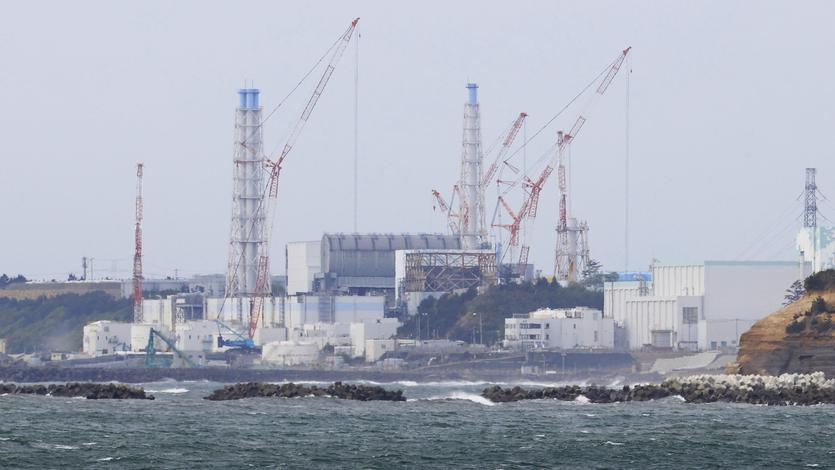 Fukushima Daiichi nuclear power plant is seen from Namie town, Fukushima prefecture, north of Tokyo on April 13, 2021, Japan's government said on Tuesday it has decided to start releasing massive amounts of radioactive water stored in tanks at the wrecked Fukushima nuclear plant in two years after treatment. (YUSUKE OGATA / KYODO NEWS VIA AP)
Fukushima Daiichi nuclear power plant is seen from Namie town, Fukushima prefecture, north of Tokyo on April 13, 2021, Japan's government said on Tuesday it has decided to start releasing massive amounts of radioactive water stored in tanks at the wrecked Fukushima nuclear plant in two years after treatment. (YUSUKE OGATA / KYODO NEWS VIA AP)
Chinese experts have condemned Japan's unilateral decision to discharge contaminated water into the Pacific Ocean, calling it "extremely irresponsible".
Dumping the contaminated water that resulted from the 2011 accident at the Fukushima nuclear plant is not Japan's only option, said Liu Senlin, a researcher with the China Institute of Atomic Energy.
Japan's decision to release the contaminated water is extremely irresponsible, Liu said. The choice, which involves the lowest economic cost to Japan, was made before seeking consensus with the international community and stakeholders, and before exhausting all available options.
Japan should implement prudent measures in a manner that takes responsibility for its own people and the international community, said Liu Senlin, a researcher with the China Institute of Atomic Energy, adding it should choose the best way to dispose of the contaminated wastewater with participation and supervision from stakeholders
Liu said there are several other options for contaminated wastewater disposal which include burying it underground or evaporating it into the air, but Japan opted for the cheapest plan.
"The decision passes the responsibility that should be borne by Japan itself to the whole world, setting a very bad precedent," he noted.
ALSO READ: Fish radioactive report prompts Fukushima ban
The ultimate responsibility for ensuring safety of spent fuel and radioactive waste management rests with the state, he said.
Japan should implement prudent measures in a manner that takes responsibility for its own people and the international community, said Liu, adding it should choose the best way to dispose of the contaminated wastewater with participation and supervision from stakeholders.
It is also doubtful that Japan's treated reactor water truly meets discharge standards, said Zhao Chengkun, an expert with the China Nuclear Energy Association.
As of the end of 2019, more than 70 percent of the contaminated wastewater still exceeded Japan's discharge standards after treatment, said a report from an organization researching the treatment of reactor water from the Fukushima nuclear accident.
Standard met?
Tokyo Electric Power Company, the operator handling the contaminated water from the Fukushima nuclear accident, also has a record of covering up and falsifying information, Zhao said.
Liu Xinhua, a researcher with the Ministry of Ecology and Environment, added there is a fundamental difference between contaminated wastewater arising from the Fukushima nuclear plant accident and liquid effluents from the normal operation of nuclear power plants in terms of source, radionuclide type and processing difficulty.
READ MORE: S.Korea, US show differences over Japan's Fukushima plans
The liquid waste to be discharged after the Fukushima accident contains radionuclides and extremely toxic transuranic elements such as plutonium and americium. Liquid effluents discharged normally from nuclear power plants do not directly come in contact with the fuel pellets and barely have the transuranic elements, Liu said.


